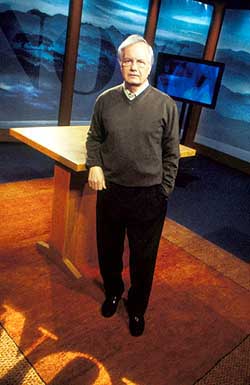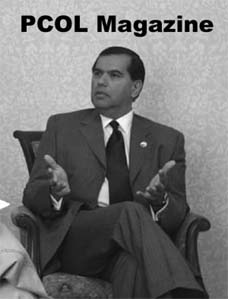September 9, 2004: Headlines: COS - USA: Staff: 911: Journalism: Television: Film Documentary: Homeland Security: Rocky Mountain News: A documentary in which Bill Moyers and producer Sherry Jones review the failures that resulted in the 9/11 terrorist attacks
Peace Corps Online:
Directory:
USA:
Special Report: Peace Corps Deputy Director Bill Moyers:
September 9, 2004: Headlines: COS - USA: Staff: 911: Journalism: Television: Film Documentary: Homeland Security: Rocky Mountain News: A documentary in which Bill Moyers and producer Sherry Jones review the failures that resulted in the 9/11 terrorist attacks
 | Our debt to Bill Moyers
Former Peace Corps Deputy Director Bill Moyers leaves PBS next week to begin writing his memoir of Lyndon Baines Johnson. Read what Moyers says about journalism under fire, the value of a free press, and the yearning for democracy. "We have got to nurture the spirit of independent journalism in this country," he warns, "or we'll not save capitalism from its own excesses, and we'll not save democracy from its own inertia." |
A documentary in which Bill Moyers and producer Sherry Jones review the failures that resulted in the 9/11 terrorist attacks

A documentary in which Bill Moyers and producer Sherry Jones review the failures that resulted in the 9/11 terrorist attacks
Fatal missteps
Moyers' 9/11 documentary scrutinizes forces behind flaws in 'the system'
By Dusty Saunders, Rocky Mountain News
September 9, 2004
In Bill Moyers' mind the question remains unanswered: How could the most powerful nation on earth have been so unprepared to protect its homeland?
The question has been asked by many, including members of the 9/11 Commission, who concluded "that terrorists exploited deep institutional failings within our government."
Advertisement
Moyers doesn't accept that answer. He contends the commission was "too careful" to avoid blaming anyone for failing to prevent the attacks of Sept. 11, 2001. And he says so in 9/11: For the Record (9 p.m. Friday, KRMA-Channel 6), a masterful TV documentary in which Moyers and award-winning producer Sherry Jones provide a riveting review of the missteps and failures of successive administrations and intelligence and security agencies during the months and years leading up to the attacks.
"Reading the 9-11 Commission report, your first impression could be that the attacks were, indeed, inevitable - that no one could have prevented them," Moyers notes in opening remarks.
It was "the system" that broke down and is to blame, according to the report. But Moyers asks: "Whose job is it to make sure the system works?"
"That remains a disturbing thought three years after, in the poet's prophetic metaphor, 'the dark birds of history' plunged into our lives."
Supporters of President Bush may automatically dismiss this hour because of Moyers' liberal leanings. But while 9/11: For the Record is severely critical of the Bush administration, it is also critical of President Clinton's as well. And it is not an incendiary attack like Michael Moore's Fahrenheit 9/11, anathema to conservatives.
The well-coordinated format features ongoing taped sequences of key witness testimony before the 9/11 Commission, interspersed with the familiar taped news reports that provide a chronological review of that disastrous day.
As reports unfold before the committee, Moyers and Jones deftly provide commentary and footage illustrating what witnesses are saying, thus providing a clear road map of the events that led to 9/11. This includes profiles and activities of terrorists, many of whom were mentioned by commission witnesses.
While such material will have a frighteningly familiar ring, the documentary gathers information and puts it into context, detailing intelligence and security failures that preceded the attack.
Events are pieced together like a difficult jigsaw puzzle. This includes looks at two hijackers in Washington, D.C., who were scrutinized by airport security after alarms went off at metal detectors. In scenes seemingly at home in a Tom Clancy thriller, they are allowed to board the airliner that eventually crashed into the Pentagon.
Moyers does point fingers, particularly at Condoleezza Rice, Bush's National Security Adviser, whose controversial testimony was a central part of the commission hearings.
He suggests her answers regarding the lack of urgency in dealing with reports about terrorist groups and their activities should remind viewers that more than "the system" failed.
Rice testified: "I don't think anybody could have predicted that these people would take an airplane and slam it into the World Trade Center, take another one and slam it into the Pentagon; that they would try to use an airplane as a missile, a hijacked airplane as a missile."
Moyers says: "But Condoleezza Rice is wrong. Had she looked, Dr. Rice might have found in the files of the intelligence community what the 9/11 Commission would uncover: The attack she deemed unimaginable had, in effect, been imagined. Repeatedly. Twelve times in the seven years before 9/11, the CIA reported that hijackers might use airplanes as weapons."
Moyers contends that early in the Bush administration, Rice ignored the intelligence chatter that "grew loud and more ominous." On June 25, 2001, according to Moyers, counterterrorism expert Richard Clarke warned Rice that "six separate intelligence reports showed al-Qaida personnel warning of a pending attack.
"Three days later, Clarke warned Rice that the pattern of al-Qaida activity indicated that the planning for an attack had reached a crescendo. Condoleezza Rice had known since January that al-Qaida sleeper cells were in the United States," Moyers reports.
"Not until Sept. 4 - after almost eight months in office - does Rice finally chair a meeting of the people in charge of the CIA, FBI, State and Defense Departments to discuss al-Qaida. She does not invite Richard Clarke. The principals meet in the White House Situation Room, but take no urgent action."
The Clinton administration is also taken to task for failure to strike at al-Qaida when opportunities arose. And Moyers contends the Monica Lewinsky scandal became a major distraction from dealing with the threat of terrorism.
Steven Simon, who worked in the Counterterrorism Security Group on the National Security Council, agrees with Moyers, saying that "the capital's political elite were engaged in massive distractions instead of focusing on information obtained about the activities of Osama bin Laden and his terrorists groups."
9/11: For the Record ends with scenes of the aforementioned terrorists slipping easily through security at Dulles International Airport. Moyers' final comment: "The public was not warned."
Moyers' numerous detractors will dismiss this hour as an example of Bush-bashing by a liberal journalist as the presidential election draws near. But this is the type of TV documentary that should be viewed, not dismissed out of hand as political propaganda.
9/11: For the Record
• What: A documentary in which Bill Moyers and producer Sherry Jones review the failures that resulted in the 9/11 terrorist attacks.
• When and where: 9 p.m. Friday, KRMA-Channel 6
Dusty Saunders is the broadcasting critic. 303-892-5137 or Saunders@RockyMountainNews.com
When this story was posted in September 2004, here was the front page of PCOL Magazine:
 | Director Gaddi Vasquez: The PCOL Interview
This month we sat down for an extended interview with Peace Corps Director Gaddi Vasquez. Read the entire interview from start to finish and we promise you will learn something about the Peace Corps you didn't know before.
Then read the questions and answers one by one and leave your comments on the issues raised during the interview including Infrastructure Upgrades and the new Situation Room at Headquarters, Is there a Budget Crunch this year at Peace Corps, Peace Corps' Long Term Expansion, the Changes to the Five-Year Rule made last year, Safety and Security Issues, the Cooperative Agreement with NPCA, RPCVs in Policy Making Positions at Peace Corps Headquarters, Peace Corps' Departure from Russia in 2002, Director Vasquez's Accomplishments as Director, the Peace Corps Safety and Security Bill before Congress, Continuity at the Agency during Changes in Administration, the Community College Program, and the Director's Message to the Returned Volunteer Community. |
Read the stories and leave your comments.

Some postings on Peace Corps Online are provided to the individual members of this group without permission of the copyright owner for the non-profit purposes of criticism, comment, education, scholarship, and research under the "Fair Use" provisions of U.S. Government copyright laws and they may not be distributed further without permission of the copyright owner. Peace Corps Online does not vouch for the accuracy of the content of the postings, which is the sole responsibility of the copyright holder.
Story Source: Rocky Mountain News
This story has been posted in the following forums: : Headlines; COS - USA; Staff; 911; Journalism; Television; Film Documentary; Homeland Security
PCOL13912
02
.



